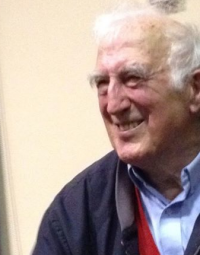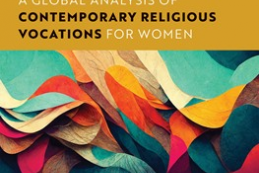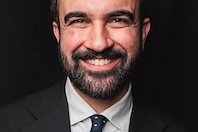Text: Jean Vanier at Heythrop College

Jean Vanier
Jean Vanier, founder of the L'Arche movement, gave a talk at Heythrop College on Sunday night, about his new book: Signs of the Times - Seven Paths of Hope for a Troubled World. In his welcoming remarks Heythrop Principal Fr Michael Holman SJ, mentioned that this year marks the 400th anniversary of the college. Jean Vanier was introduced by Dr Gemma Simmonds CJ, who pointed that it was the feast of the Epiphany, celebrating the Magi who followed the star in their quest for divine wisdom. In 2010, Asteroid 8604 was renamed in honour of Jean Vanier. In response, Vanier commented:" I feel uncomfortable when people say nice things about me". He then began (speaking without notes):
I want to tell you about something Dietrich Bonhoeffer wrote in in prison while he was waiting to be guillotined...
in this article he says 'I'm not quite sure who I am. Some people say I'm great. They say nice things about me. They say I'm peaceful. And then there's me. What I feel is anguish, fear. All sorts of things. Who am I? Am I what people say who I am or am I what I feel?'
Then he ends up and in a prayer to Jesus says: 'I don't quite know who i am. All I know is that I am thine.' We don't know quite who we are but we belong to Jesus. And that's the only important thing.
I'm going to travel with you a little bit around the book which is seven whatever it is - seven steps - and I want to begin with the first step which is from humiliation to humility.
What I can say to begin with is that for 50 years I've been living with people who've been terribly humiliated, pushed aside, unwanted, put into institutions. aborted. We don't want them - get rid of them. By any way that is possible.
So I'd like with you to walk with people who've been humiliated. You probably know people who've been humiliated, because they've been pushed aside, felt unloved, unwanted. They could be in the streets, people with mental sickness and over the history of the world - when you think of the history slavery, the history of people of different colour, the humiliation of people of different sexual orientations, people pushed down, because we're in a society which where we encourage people to go up, because if you go up you have to push people down to get a little bit higher up.
We're in a world of efficiency and competence and promotion, success, individual success, all this movement to go up the ladder. But then there're all those who will never ghetto up the ladder. We get so caught up in our group, we want so much to win, to win, to win, and then there are all those who can never win.
I'd like to tell you a story of somebody who came to our community in 1970. Pauline. she was hemiplegic - one arm paralysed, one leg paralysed, epileptic, diabetic. What characterised Pauline was immense rage, anger. She couldn't hit people because she risked falling over, but she could break things and she could throw herself on the ground and so on and scream and scream.
We had a that time a good psychiatrist Erroll .. and he helped us to understand where the violence was coming from. I remember him telling us that she'd lived 40 years of humiliation. Her parents didn't want her - (aside to audience: I'm embarrassed to see people standing up - you'll get tired something will happen. If I was you at least I would sit on the floor. Also it means if you stand up you can slip away more quickly.. Advantages. Please. I don't want to say relax but I get tired looking at you. But anyway I want to get back to Pauline…)
40 years of humiliation - her parent didn't want her like that. In 1970 she was 40. She born in 1930. School, no. She was laughed at in the streets. One leg paralysed an arm paralysed. Jealous. Her two sisters had children she had no children. She hated herself. She hated her body. I can understand that. The body was reasonable but difficult. People laughing at her, mocking her. Looking down at her. Seeing her as mad and all the rest.
Our psychiatrist said her violence is a language. She is saying something and what she is saying is 'Does anyone, anyone respect me, does anyone want me? Does anyone like me does anyone.?
There's a lot of violence in our world. And from violence comes humiliation. Looking down at people. Thinking I am better than you.
I remember Errol saying, 'what she wants is that you just become her friend. that's all. To live with her. And of course the way we live is precisely that. We live together, eat together, laugh together, work together, hike, fool around together, pray together . What our reality is just being together.
Somehow being together is .. .. I'd say the heart of the pedagogy of life is just to say; 'I like living with you. I like being with you. Not just saying beautiful things. Its easy to say beautiful things. But how to put the walk and the talk together. To reveal to Pauline you are precious. You are a child of God. You have something for me.
The thing with L'Arch is that we're not there to do things for people though we do - but to be and to reveal and to reveal in such a way that we can see behind the disabilities, behind the violence - Its you - its you. its your heart. Sometimes a broken heart. Reading a text by a psychiatrist and he said: ' What strikes he as I listen to people is that how many people how all people need to be consoled. How many are carrying a feeling of not wanted, pushed aside. A feeling then of guilt. Because the hatred that Pauline had for herself was because people didn't want her. That is the story of people with mental illness, people with disability. the story of so many people pushed out. Not listened to . Not wanted.
That why somewhere at the heart of L'Arche there's the little text when Jesus said: 'When you give a meal don't invite the members of your family, ( I thought Jesus was rather pro family) don't invite your rich neighbours, (though they might give you some money) don't invite your friends but when you give a really good meal, a banquet - invite the poor, the lame, the disabled and the blind and you shall be blessed. Not they because because they have had good food, But you because you have invited them, you will be blessed. Its a Beatitude. You will be changed. You will be transformed.
The danger of we human beings is to live in clubs, clans, social status, in religious groups. in culture. . We know our culture its a mess. So what Jesus is saying, about giving a meal in Biblical language is becoming friends. If you become a friend of those who have been pushed to the side, something will happen in you. Something will happen because you will discover that Pauline, she is loved. Of course she's loved. she has every right to be loved. Of course she has disabilities of course. But you will discover something if you start living with her and eating with her, you will discover her heart. A beautiful heart . What she wants is what we all want. A friend. To be together. a certain oneness communion, friendship, mutual presence. Trust.
You know there's a struggle in all of us of one side there's the need to be acclaimed. But on the other side there's the need for friendship and bonding. Maybe there s a sort of struggle in all of us of between this need to go up and be clapped and just to have friends. May be that question of Bonhoeffer is in all of us. Am I someone because some has clapped me or am I what I know I am - my own fragility, my own fragility, my own brokenness my own anguish. And Bonhoeffer maybe is the one who gives wisdom i don't quite know who `i am. But I belong to you….
One of our gifts in my community is that we have a little spiritual centre where we can give retreats for people on the street, and people in prostitution, and we gave a retreat with a lady who was working with people caught up in the world of prostitution, and there 14 were coming. Actually only two came. I can understand that. Not many were used to retreats. Anyway two of them came. One of them was from Nigeria. She didn't speak a word of French, which was probably not necessary with with the work she was doing. Her name was Blessings and I asked her how is it that you came here, and she told her story… she didn't tell all because she didn't quite trust but she said, I was taken from Nigeria to Cairo, from Cairo to Turkey, from Turkey to Greece. In Greece they gave me false papers and then I came to France. What's going on! What is this mafia trade? What is happening? Humiliation. She didn't have a word of French but I saw she had many acquaintances in the Christian churches I felt an admiration for the beauty of this woman.
A world where we humiliate each other….
Also we welcome in our community Eric. Eric was the eldest child of a family. He was blind he was deaf he couldn't walk. I think I've never seen somebody with so much anguish. Anguish as you know, is very different from fear. It can be a dog or a dark alley or whatever but take away the dark ally or take away the dog and the fear is gone. Anguish is more existential. Who am I? Does anyone want me? Does anyone love me?
Eric was put in hospital at the age of two transferred to the psychiatric hospital. Then at the age of 16 he came to our community . He just didn't know who he was. He had a name but he didn't have a family. In the psychiatric hospital there was nobody was able to say you are mine and I am thine. So no family. There again the whole pedagogy of L'Arche is to reveal to Eric, your are precious, you are beautiful.
He taught me a great deal. I had the privilege of living with him in my roles leader of the community .. and of course with Eric the only communication with him was through flesh as he cannot not see, he cannot not hear. So through touch - to reveal to him the way of touching that you are that you are important. Touch - touch gently. To touch his body - you have no better body and the body is the temple of the spirit and the spirit of God is living within you. You are precious. He taught me a great deal about touch. And the moment which was most important was bath time . The sort of respect The precious respect. For Pauline it takes time, everything takes time. Her violence gradually subsides and then she discovers that she wanted that she is precious that there are beautiful things she can do. To move from humiliation to acceptance to discover who I am,
Eric - all he could say was that he began to discover that he was loved. And he had a place. Another very beautiful moment was sometimes after supper, we would put on pyjamas and then we would sing and sit and pray and frequently he would come and sit on somebody's knees and he would rest or sleep, and he would discover tenderness . Tenderness is something very important. I remember another psychiatrist who lived with us for 26 years i asked him, 'Patrick, for you what is the sign of the maturity of a human being?' Without an instant he said Tenderness.
Tenderness is not just the way I can touch your hand or put my arm around your shoulder, it is in a way that gives you the certitude that you are someone . That I'm not there to possess you I'm not more important than you. Tenderness is a meeting. To listen tenderly without interrupting. To understand where your pain is. I'm always touched that the very first words of Jesus risen from the dead are not Allellulya I've won. His very first words are why are you crying? Where is your wound? where is your pain? The very first words of the Risen Jesus.
To meet people at that level which means somewhere that I have to change and I must say that living or being with Pauline, being with Raphael or Philip who were two I began to live with when I took them out of a very violent institutions. Its true that living with them has changed me quite radically. Before I had been a Naval officer and that sort of stuff. Before I began L'Arch was a sort of serious type, and then I left the Navy to follow Jesus and prayer, and then I did a Doctorate in Philosophy, you know. Living with them I discovered the most important thing was I could become a child again. We have fun together, do the dishes together. They criticised me a lot because they think I didn't wash them well, but we had fun together. Thats what we all need…. to be a child to laugh and sing and celebrate..
The wonderful thing - in order to meet Pauline and in order to meet Eric - is to have fun. Not to be too serious. not always to be a pedagogue. To celebrate life together. Not to be too serious. It's as we celebrate life together there the revelation we are all the same - we are all children of God together. We have different roles to play, different jobs, different gifts but essentially its to have fun together. To have fun together to celebrate life to give thanks.
We have a community in Damascus and just recently there was a meeting in Beirut and our community came from Damascus because the roads were open. The question came up what is the mission of the community in Damascus today. And they came up with two things - the first was never to be caught up in fear, but the celebrate life . I was going to speak to them over Skype…. (I've never quite understood that). But unfortunately a missile had hit the centre of Damascus so we could phone but we couldn't Skype together . So not to sit there petrified, although there was every reason to be frightened - but to trust.
The other reason we decided was the mission in Damascus was never to be a wall but always a window. Never a wall that stops people coming in but a window. Of course the only problem is that windows break. ….
One of the most important moment in L'Arche, is when we learn to wash each other's feet which we do obviously on Maundy Thursday but at other times too. I remember a retreat we had given to people off the streets -
there was a big man with a lot of anger - but when he washed my feet he showed tenderness.
The icon of tenderness is obviously Mary with the Child Jesus with the cheek of Jesus on her cheek. Through the body revealing that you are precious Unfortunately tenderness today get confused with sexuality. Whereas throughout the body is to reveal that you are precious. You have value. I don't possess you. We are together. Tenderness is a way of listening, a way of looking, a way of being. Revealing that you are precious. Revealing a deep security. That is what a mother and a child have. A mother-child relationship gives security. But its also revealing that you in your body, you are precious.
Note: Jean Vanier went on to reflect on the second chapter of his book on 'from conformity to conscience' - I hope to be transcribing that soon. We will also be reviewing his book: Jean Vanier Signs of the Times - Seven Paths of Hope for a Troubled World, published by Darton-Lomgman & Todd


















